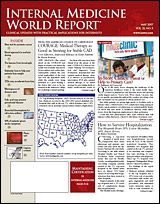Chronic Drinking Increases Sleep Apnea in Men
Clin Sleep Med
The likelihood of sleep-disordered breathing, which refers to sleep apnea and upper airway resistance syndrome, is greater among men who drink alcohol habitually, and the risk increases with each drink, investigators report in a new study (. 2007; 3: 265-270).?Until now, breathing difficulties in sleep were thought to be associated only with acute drinking.
IMWR
“We found that in men, even moderate habitual alcohol consumption increased the risk of sleep-disordered breathing,” lead investigator Paul Peppard, PhD, senior epidemiologist with the Population Health Institute, University of Wisconsin Medical School, Madison, told . “Each additional alcohol drink per day increased the odds of sleep-disordered breathing by approximately 25%.”
Millions of adults in the United States have sleep-disordered breathing, which is a known risk factor for hypertension, vascular disease, and overall impaired functioning.?
Dr Peppard said that previous studies showed that men and women with the condition should be advised to avoid alcohol near bedtime, because it could exacerbate breathing problems during sleep. “Our study extends this by suggesting that alcohol consumption at any time of day, not just before bedtime, should be minimized in persons with sleep-disordered breathing,” he said.
The findings did not show an association between moderate habitual alcohol consumption and sleep disturbances in women. “However, even though our sample included hundreds of women, we had relatively few women with both sleep-disordered breathing and substantial alcohol consumption. Thus, more data on women are required to judge whether habitual alcohol consumption in women might have the same detrimental effect on sleep-disordered breathing as suggested by our data on men.”
This study included 775 men and 645 women from the ongoing Wisconsin Sleep Cohort Study (aged 30-60 years when the study began in 1988) who completed an overnight evaluation that included nocturnal polysomnography and other clinical tests.?
For this study, the participants arrived in the early evening and were asked about alcohol use, medical history, current medications, smoking, and sociodemographic factors, including age.?Trained sleep technicians scored sleep stages and respiratory events. The scores were then reviewed by an expert polysomnographer.
Men who reported habitually consuming ≥1 alcoholic drinks per day were more likely to have mild sleep-disordered breathing (≥5 apnea/hypopnea index [AHI] events per hour) than men who consumed no alcohol. Each additional drink daily increased the odds of sleep-disordered breathing by 25%. This positive correlation was observed in men, but not in women, with mild sleep-disordered breathing; there was no such correlation between moderate or worse sleep apnea (≥15 AHI events per hour) in either men or women.
IMWR
“We have known for a long time about the acute effects of alcohol on sleep apnea, but to my knowledge there is little written about the chronic use of alcohol’s effects.?This paper shows that, a least in men, chronic use of alcohol does appear to increase risk for sleep apnea, which is a novel finding,” Nancy Collop, MD, associate professor of medicine at Johns Hopkins University in Baltimore, and the medical director of the Johns Hopkins Sleep Disorders Center, told .
Dr Peppard added, “Physicians seeing patients with sleep-disordered breathing or at risk for sleep-disordered breathing—that is, overweight and/or frequently snoring patients—should advise those patients to avoid any alcohol near bedtime and minimize alcohol consumption at other times of day.”
